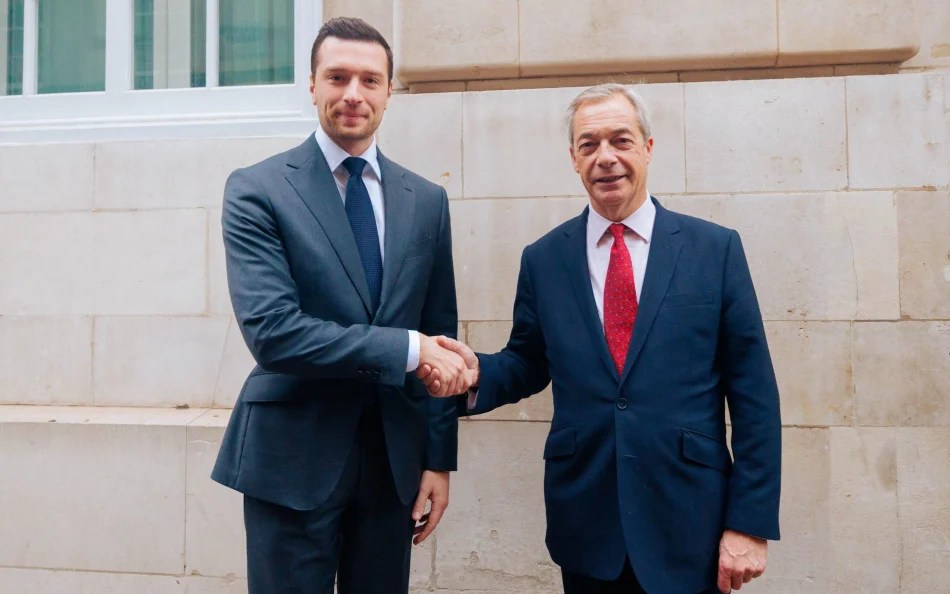Violence erupted in Bucharest on Sunday evening after Romania’s Central Electoral Bureau disbarred Calin Georgescu from standing in May’s re-run presidential election. In a statement, the bureau justified its decision to exclude Georgescu on the grounds his candidature ‘doesn’t meet the conditions of legality’ because he ‘violated the very obligation to defend democracy’.
Supporters of Georgescu, who has been described by the BBC as a ‘far-right, pro-Russia candidate’, gathered outside the Central Electoral Bureau to vent their fury, and they soon clashed with police.
Until six months ago the name Georgescu was unknown outside Romania. Then the 62-year-old stormed to victory in the first round of November’s presidential election, a result that stunned Europe’s political elite.
This alarm grew as opinion polls indicated Georgescu would win the second round. Something had to be done, and it was. A couple of days before the decisive vote, Romania’s Constitutional Court annulled the first round because of alleged Russian interference. The court had perused some declassified intelligence documents that claimed 800 TikTok accounts had been activated shortly before polls opened. There was no evidence of voting irregularities in the election itself but the fact Russia had been active on social media was enough for the court to intervene.
At the time, Georgescu likened himself to Donald Trump: an anti-system candidate who was the target of Establishment ‘lawfare’. The Trump administration has subsequently cited Georgescu as an example of the EU’s creeping illiberalism.
In a speech at last month’s Munich Security Conference, vice-president J.D. Vance expressed his astonishment ‘that a former European commissioner went on television recently and sounded delighted that the Romanian government had just annulled an entire election… these cavalier statements are shocking to American ears.’
The commissioner in question was Frenchman Thierry Breton, who in a television interview in January boasted that ‘We did it in Romania and we will obviously do it in Germany if necessary.’ He was referring to the upcoming German election and the possibility that the right-wing Alternative for Germany (AfD) might win.
As it turned out, simply annulling Romania’s presidential election didn’t derail the Georgescu bandwagon. Quite the opposite. He picked up momentum and polls showed that he would romp to victory in May’s re-run election. As I predicted in January, Romania’s elite wouldn’t allow this to happen.
And they haven’t. At the end of February, Georgescu was detained by police as he drove through Bucharest to file his candidacy in the election. He was indicted on six counts, among them false funding sources and false information in his last campaign. He was also barred from leaving the country and creating any new social media accounts.
Now he is barred from standing for president, a decision he has called a ‘direct blow to the heart of democracy worldwide’.
Right-wing politicians are being shut out of government across Europe. The AfD didn’t do as well as Thierry Breton feared in Germany; they came second, winning 20 per cent of the vote, eight percent behind the centre-right CDU.
The votes of millions of Romanians, Germans and Austrians have been tossed aside by Europe’s elite
But the CDU swiftly ruled out inviting the AfD to be part of its coalition government. Rather, they are in talks with the Social Democrats, an odd reward for a party that in finishing third recorded their worst performance in an election since 1945.
Alice Weidel, the co-leader of the AfD, described the snub as ‘undemocratic…you cannot exclude millions of voters per se.’
Something similar has happened in Austria, but in the case of the anti-immigration Freedom Party they actually won last October’s election. Still, they won’t be part of the recently-formed coalition government because the Conservative People’s party, the Social Democrats and the liberal Neos refuse to be in the same room as them.
The leader of the Freedom Party, Herbert Kickl, has described the alliance as a coalition ‘of losers’.
In the space of a few months, the votes of millions of Romanians, Germans and Austrians have been tossed aside by Europe’s elite.
It may not stop there. At the end of this month, Marine Le Pen will learn if her political career is over. Last autumn the leader of France’s National Rally stood in a Paris dock accused of misusing EU funds. The prosecutors have demanded she be disbarred from running for office for five years. The verdict will be delivered on 31 March.
Le Pen claims she is the victim of ‘unbearable political interference in the democratic process’.
She’s not the only one in an increasingly illiberal Europe.








Comments